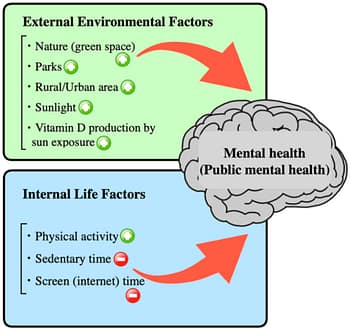Mental health doesn’t exist in a vacuum. While our internal thoughts and emotions play a major role in our well-being, the world around us—our environment, relationships, and life circumstances—can have a powerful impact on how we feel and function. Understanding how external factors affect mental health is essential for managing stress, building resilience, and seeking the support we need.
In this post, we’ll explore the key external influences that can shape mental health, both positively and negatively.
1. Environment and Living Conditions
Where we live has a direct impact on our mental state. Factors like overcrowded housing, noise, pollution, and lack of green spaces can contribute to anxiety, irritability, and depression. On the other hand, safe, clean, and peaceful environments can promote a sense of calm and emotional stability.
Examples:
- Urban noise and traffic can lead to chronic stress and sleep disturbances.
- Access to natural spaces (like parks or walking trails) is linked to improved mood and reduced symptoms of depression.
2. Socioeconomic Status
Financial stress is one of the most common triggers for mental health struggles. Worrying about housing, job security, or affording basic needs can increase the risk of anxiety, depression, and low self-esteem.
Impact of financial instability:
- Constant stress about money can lead to chronic anxiety.
- Limited access to healthcare or therapy can prevent individuals from seeking help when needed.
- Economic hardship can contribute to feelings of hopelessness or worthlessness.
3. Social Relationships and Support Systems
Humans are social beings. Our relationships—with family, friends, coworkers, and communities—can either support or hinder our mental well-being.
Positive support:
- Having people who listen, validate, and care about you provides emotional security and boosts self-worth.
Toxic or strained relationships:
- Ongoing conflict, emotional neglect, or abuse can lead to emotional exhaustion, anxiety, and depression.
4. Work and School Environment
The settings in which we spend most of our day can greatly affect our mental state. High-pressure environments, lack of recognition, or unclear expectations at work or school can lead to burnout and emotional distress.
Signs of impact:
- Constant pressure to perform can lead to chronic stress and anxiety.
- A toxic work culture may cause isolation, low motivation, or depression.
5. Media and Technology
While technology connects us in many ways, it also presents new challenges for mental health. Social media, in particular, can lead to unrealistic comparisons, cyberbullying, and feelings of inadequacy.
Mental health effects of media overexposure:
- Increased anxiety and depression from constant comparison.
- Doomscrolling and exposure to negative news can increase fear and helplessness.
6. Life Events and Trauma
Major life changes—such as loss, divorce, moving, or illness—can deeply affect our mental health. Even positive changes like starting a new job or becoming a parent can bring stress and emotional overwhelm.
Traumatic events, including abuse, violence, or accidents, can leave lasting emotional scars if not processed with support and care.
How to Protect Your Mental Health From External Influences
While we can’t control everything around us, we can take proactive steps to protect our mental health:
- Set boundaries with people or environments that drain you.
- Practice self-care routines that ground and calm you.
- Seek support from mental health professionals or trusted loved ones.
- Limit media consumption if it’s negatively impacting your mood.
- Create positive spaces—whether it’s decluttering your home or spending time in nature.

Final Thoughts
External factors can play a significant role in shaping our mental health, often in ways we don’t immediately recognize. By becoming more aware of how our surroundings and experiences affect us, we can take empowered steps toward healing, balance, and emotional resilience.
Need guidance navigating external stressors in your life? Reach out to schedule a free consultation or call us at 719-233-8336. You don’t have to go through it alone—support is just a call away.





